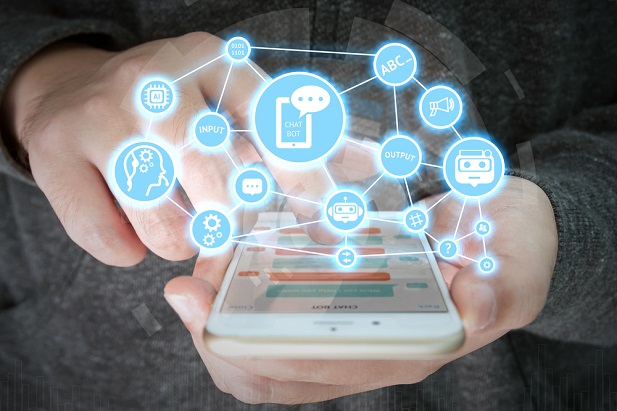 Thenew rules also have raised concerns about privacy as technologycompanies, such as Google, Microsoft, Apple and Amazon, open up newmarkets for providing medical records through mobile apps. (Photo:Shutterstock)
Thenew rules also have raised concerns about privacy as technologycompanies, such as Google, Microsoft, Apple and Amazon, open up newmarkets for providing medical records through mobile apps. (Photo:Shutterstock)
Federal officials on Monday released groundbreaking rules thatwill let patients download their electronic health records and other health caredata onto their smartphones.
|"Patients should have control of their records, period. Nowthat's becoming a reality," said Health and Human ServicesSecretary Alex Azar. "These rules are the start of a new chapter inhow patients experience American health care."
|Officials said the rules likely will give patients a greater sayin health care decisions and put an end to a long-standing practicein which some doctors and hospitals resist handing complete medicalfiles over to patients upon demand. Many of the provisions are setto take effect in 2022.
|Related: Managing medical records via smartphone might takea while to catch on
|"The days of patients being kept in the dark are over," saidCenters for Medicare & Medicaid Services Administrator SeemaVerma. "In today's digital age, our health system's data-sharingcapacity shouldn't be mired in the Stone Age."
|Yet the new rules also have raised concerns about privacy astechnology companies, such as Google, Microsoft, Apple and Amazon,open up new markets for providing medical records through mobileapps. Major EHR vendor Epic, for instance, has warned that freerflow of medical records could spur the unwanted sale of data orother unauthorized uses.
|"Family members may be shocked to find that their most personalhealth data has been mined and sold by data brokers and is nowknown by others, Epic CEO Judy Faulkner wrote last June in opposingthe rules.
|Administration officials said they have taken privacyconsiderations into account and would require developers to attestto plans to protect the security and use of medical data.
|Verma took a swipe at Epic in an interview with KHN andFortune.
|"We're not afraid to take on special interests to do what'sright for patients. Some people disagree because they want to keepthe data," she said. "The reality is that patient data belongs topatients. It doesn't belong to EHR companies."
|Verma said the nation's health care system remains "hugelyexpensive and inefficient as repeat tests drive up costs and,perhaps most importantly, doctors are forced to provide care withan incomplete clinical picture, especially at a time when thehealth care systems could be under stress."
|"With the handling of the COVID virus, the urgent need forcoordinated integrated care could not be clearer," she said.
|Donald Rucker, who coordinates health information technologypolicy for HHS, said the new rule "will allow patients the abilityto manage their health care the same way they manage their financesor the travel or other parts of their life on theirsmartphone."
|While Epic, the maker of the most-used electronic health recordssoftware, led a campaign to derail the rules, its chief competitor,Cerner Corp., argued the rules were long overdue.
|"Consumers should have the right to access the health careinformation their providers have about them and dictate where theywant it to go. Although existing laws allow patients to accesstheir data, it doesn't work," Cerner CEO Brent Shafer said in astatement.
|The rules also attempt to prevent EHR vendors from silencingcritics of their software products. The government wants toencourage doctors and other users of EHR technology to share theirexperiences about software problems by prohibiting so-called gagclauses in sales contracts. That could free users to criticize EHRsystems, including more open discussion of flaws, software glitchesand other breakdowns.
|"BotchedOperation," an investigation published by Kaiser Health Newsand Fortune lastyear, found that the federal government has spent more than $36billion on the EHR initiative. Thousands of reports of deaths,injuries and near misses linked to digital systems have piled up indatabases over the past decade — while many patients have reporteddifficulties getting copies of their complete electronic files, theinvestigation found.
|Consumers have long sought to be more in the loop on health caredecisions in a user-friendly form. Many specifics about how thatwill happen, including how patients would make sense of complexpricing policies for purchasing health care and insurance andassessing quality, remain unclear, however.
|To cut down on exorbitant "surprise" medical bills, Verma said, the CMS' new rule would require insurers tolet patients know which medical providers are in their networks.One study found that such bills — often not covered by insurance —have struck more than half of American adults.
|For well over a decade, federal officials have struggled to setup a digital records network capable of sharing medical data andpatient records. In 2004, President George W. Bush said he hoped tohave a digital record for most Americans within five years. Inearly 2009, the Obama administration funneled some $36 billion ineconomic stimulus money to help doctors and hospitals buy thesoftware needed to replace paper medical files.
|Despite the slow progress, federal officials remain optimisticthat digital records will save the nation billions of dollars whilereducing medical errors, unnecessary medical testing and otherwaste — and encouraging more Americans to take a bigger role inmanaging their health care by comparing prices.
|Trump administration officials on Monday sought to blame theObama administration for creating what they called a "tower ofBabylon," in which doctors and health systems couldn't seamlesslyshare patient information or "talk to one another."
|"It's led to a tremendous amount of frustration on the part ofmedical professionals and patients as physicians, interacting withpatients, oftentimes spend more time looking at computer screensthan they do into the eyes of the people they're trying to heal,"said White House official Joe Grogan.
|KaiserHealth News is a nonprofit news service coveringhealth issues. It is an editorially independent program of theKaiser Family Foundation, which is not affiliated with KaiserPermanente.
Read more:
Complete your profile to continue reading and get FREE access to BenefitsPRO, part of your ALM digital membership.
Your access to unlimited BenefitsPRO content isn’t changing.
Once you are an ALM digital member, you’ll receive:
- Critical BenefitsPRO information including cutting edge post-reform success strategies, access to educational webcasts and videos, resources from industry leaders, and informative Newsletters.
- Exclusive discounts on ALM, BenefitsPRO magazine and BenefitsPRO.com events
- Access to other award-winning ALM websites including ThinkAdvisor.com and Law.com
Already have an account? Sign In
© 2024 ALM Global, LLC, All Rights Reserved. Request academic re-use from www.copyright.com. All other uses, submit a request to [email protected]. For more information visit Asset & Logo Licensing.








